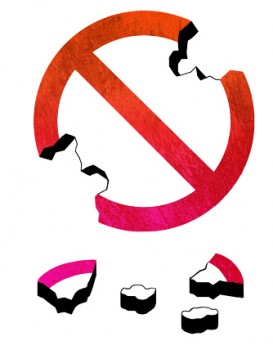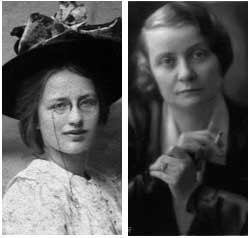Non-fiction
The next generation
23 October 2009 | Columns, Tales of a journalist
Truth will not out, and neither will humour, if things cannot be freely discussed in the media without fear of giving offence, argues Jyrki Lehtola
One September weekend I was in the city of Turku watching Finland’s first ‘comedy roast’ being taped before a live audience for a television pilot.
Roast is a tradition originating in the US. At its centre is a celebrity guest of honour, the roastee. One after another, well-known comedians take the stage and for several minutes make fun of the guest of honour, on the premise that no subject is out of bounds and the more sensitive the topic, the more arrogantly it must be raised to the fore.
The task of the guest of honour is to be able to laugh at him- or herself as well as at the comedians, and at the end to propose a counter-roast, i.e. insult the insulters. Easy targets like reality TV stars are not chosen but rather prominent figures with extensive careers to their name, people for whom the mockery contains the same mix of respect and warmth as a stag night roast. A roast is a language game in which the most important thing is that everyone, including the audience, understands and accepts the rules. More…
What’s so great about paper?
17 September 2009 | Articles, Non-fiction
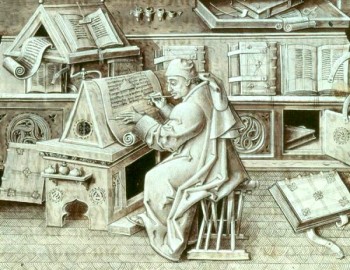
High-tech: the ultimate gadgets of the 15th century, parchment and pen. A portrait of Jean Miélot, the Burgundian author and scribe, by Jan Tavernier (ca. 1456)
The day will soon come when commuters sit on a bus or train with their noses buried in electronic reading devices instead of books or newspapers. Teemu Manninen takes a look at the digital future
Most people interested in books are aware of the arrival of electronic reading devices such as the Amazon Kindle, a kind of iPod — the immensely popular portable music listening device made by the company Apple — for electronic books. For a literary geek like me, the Kindle and e-readers should be the ultimate gadget: a whole library in a small, paperback-sized device. However, I’ve been wondering why digital reading hasn’t become as popular as digital listening. I myself have not invested in an e-reader, although I ought to be exactly the desired kind of customer. After all, I read all the time. Even the mp3 player I have is mostly used for listening to audio books. More…
Here and there
11 September 2009 | Extracts, Non-fiction
Extracts and photographs from Jotain on tapahtunut /Something happened (Musta Taide, 2009; translation by Jüri Kokkonen)
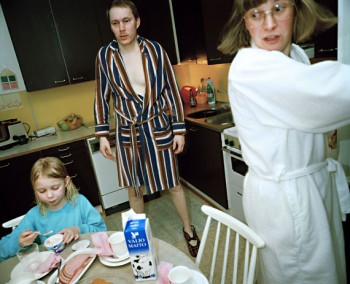 News photos document dramatic, dangerous or tragic incidents – but the photojournalist Markus Jokela is interested in documenting ordinary, domestic and everyday life, be it in Iraq, Russia, Biafra or Sri Lanka. These photographs, with commentaries, are taken from his new book, Jotain on tapahtunut / Something happened (2009), offering glimpses of life in contemporary Finland and in the United States
News photos document dramatic, dangerous or tragic incidents – but the photojournalist Markus Jokela is interested in documenting ordinary, domestic and everyday life, be it in Iraq, Russia, Biafra or Sri Lanka. These photographs, with commentaries, are taken from his new book, Jotain on tapahtunut / Something happened (2009), offering glimpses of life in contemporary Finland and in the United States
I’ve never been particularly enthusiastic about individual news photos, especially about taking them.
A good news photo has to state things bluntly and it has to be quite simple in visual terms. It must open up immediately to the viewer.
But the images in photo reportages do not have to scream simplified truths. They can whisper and ask, and open up gradually. One can come back to them. The reportage is something personal. Though a poor medium for telling about the complex facts of the world, it can provide experiences that survive. More…
Pleased to see me?
16 July 2009 | Columns, Tales of a journalist
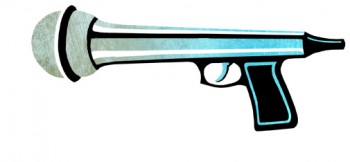
Illustration: Joonas Väänänen
When the Finnish media developed a crush on the country’s foreign minister, writes Jyrki Lehtola, no one could foresee the consequences. Especially if the object of their affections might begin to believe what they say about him…
It is a generally accepted truth that the spiteful media only raise people up in order to cast them down again a moment later.
Generally accepted truths are often not the case, although the media’s amorous relationships are, as a general rule, of short duration. More…
Too beautiful
2 July 2009 | Extracts, Non-fiction
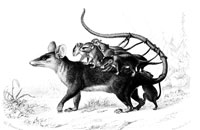
Illustration: The Universal Dictionary of Natural History (Paris, 1849)
Extracts from the collection of essays Kutistuva turska ja muita evoluution ihmeitä (‘The shrinking cod and other evolutionary marvels’) by Hanna Kokko & Katja Bargum
Who cannot but stand in awe of the genius of various parasites’ nervous system manipulations or of how beautifully the orchid ensures its pollination? The astonishingly precise adaptations of organisms are the starting point for the idea of Intelligent Design. According to Intelligent Design, such adaptations are too perfect to be products of evolution – rather, they reveal the actions of an intelligent designer. It’s a fascinating idea, write Hanna Kokko and Katja Bargum – but is it science? More…
Worlds apart
18 June 2009 | Extracts, Non-fiction
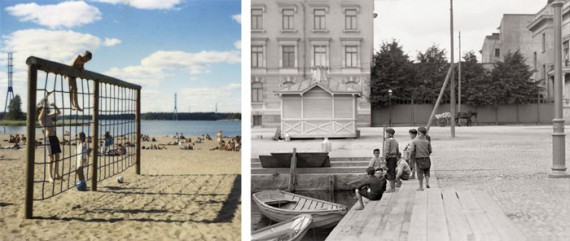
Helsinki boys by the sea: in Martti Jämsä’s Polaroid lads play on the beach; in I.K. Inha’s photograph (Hietalahden satama, ‘Hietalahti harbour’), taken a century earlier, barefoot urchins meet up on the quayside
A hundred years ago the photographer I.K. Inha (1865–1930) was asked to illustrate a tourist guide to Helsinki. He took some 200 photographs, of which some 60 were included in the book, which was published by WSOY in 1910. In his new book of photographs, OPS! Helsinki Polaroid¹, Martti Jämsä (born 1959), wanders the same streets a century on, taking snapshots with his Polaroid camera. More…
Marginal notes
4 June 2009 | Essays, Non-fiction
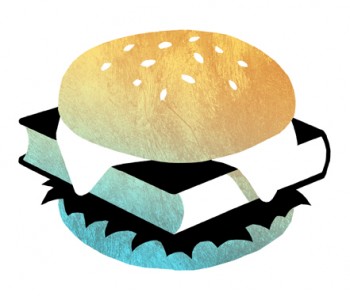
Fast food for thought? Culture meets business. – Illustration: Joonas Väänänen
Extracts from a collection of writings, Ulkona (‘Outside’, Siltala, 2008)
Literature – and ‘serious’ writing in particular, the kinds of texts we publish in Books from Finland – is often seen as lost, irrelevant, pushed out to the edge of mainstream popular culture. But, argues Hannu Raittila, the margin is actually the area of greatest freedom. Everything worthwhile happens there – and business would do well to imitate art, rather than the other way round
It is easy to see culture as a marginal part of society, if viewed from an economic perspective. It is easy to see literature, for its part, as a marginal phenomenon even when compared with other areas of culture – pop music, for example. More…
Re-inventing the book: on the papernet, pod and the unbook
20 May 2009 | Articles, Non-fiction
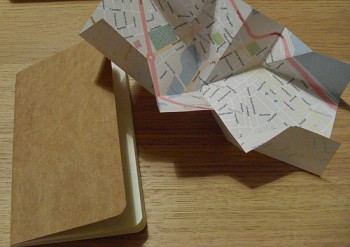
Mind-map: using the papernet to produce books just for you. - Photo: Brian Suda
Just as Books from Finland finally goes online, the brightest minds of the internet are forecasting a return to paper. In the first of a series of articles, the poet and scholar Teemu Manninen celebrates the second coming of the book
Last week I did something I’ve never done before. I uploaded the manuscript of my third book on to the website Books on Demand, an internet print-on-demand (‘pod’) service, chose the format (a large 19×22 cm size with a hard cover), selected a picture for my cover, copy-pasted a poem by Clark Ashton Smith – an American science fiction and fantasy writer – on the back flap and ordered a copy. More…
I hate your Face(book)
5 May 2009 | Columns, Tales of a journalist
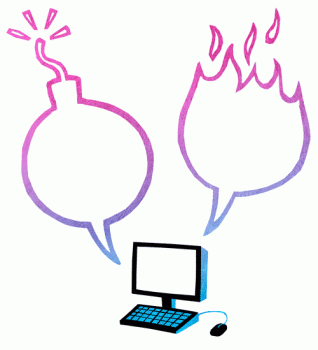
Illustration: Joonas Väänänen
Just how ‘free’ is free speech? Pay a visit to any internet chatroom, and you’ll see. In the first column of a new series called ‘Journalist’s tales’, the media critic Jyrki Lehtola investigates intolerance on the internet
First there was utopia. Then came people, and utopia suffered.
As with all new inventions, from electricity to the atom bomb, internet social networks were supposed to make our lives better. They were supposed to give us license to network, to participate, to get to know each other, to get reacquainted, to flirt, to find an extramarital lover and to be connected to as many people as possible in as many inconsequential ways as possible. More…
Keeping up with the Joneskis
17 April 2009 | Extracts, Non-fiction
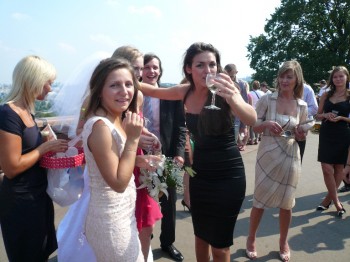
Toasting the bride: cheerful wedding parties drive up to the Sparrow Hills in Moscow in summer
Moscow-based journalist Anna-Lena Laurén finds the new Russia a promised land of materialism – a place where appearances are everything, and how you pay for maintaining them is a matter of strictly secondary interest
‘I want to go to the nightclub by boat! Come on, let’s hire one,’ Ilya says, heading towards the shore where a boat for at least twenty people is moored. There are six of us.
After two minutes of negotiation, he takes up his position alongside the gangway. He welcomes us onboard with a chivalrous gesture. We step onto the boat and are gently taken off down the Moyka canal in the white night of St Petersburg in June. The sky is pale pink and dark blue-lilac, the air damp and cold, but the captain hands out rugs to keep us warm. The ornamented bridges and pastel-coloured façades of St Petersburg glide past in a faint glow, it’s just light enough to make out the colours, powdery pink, vanilla yellow, pale blue. More…
Self-made man
1 April 2009 | Extracts, Non-fiction
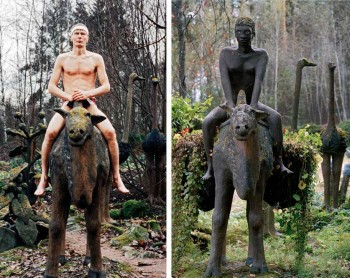
On camelback: in the exotic part of Veijo Rönkkönen’s concrete cosmos there are animals and palm trees, side by side with the living plants of the northerly latitudes. - Photo, left: Veijo Rönkkönen; right: Veli Granö.
Extracts and photographs from Veijo Rönkkösen todellinen elämä / The real life of Veijo Rönkkönen (Maahenki, 2007. Translation: Kirsti Nurmela-Knox)
Veijo Rönkkönen (born 1944) has lived all his life on an isolated, small farm in eastern Finland, Parikkala, less than a kilometre from the Russian border, where he has quietly built a garden inhabited by nearly five hundred human figures made of concrete. Entrance is free.
Digital dreams
4 February 2009 | Essays, Non-fiction
In this specially commissioned article, the first for the new Books from Finland website, Leena Krohn contemplates the internet and the invisible limits of literature.
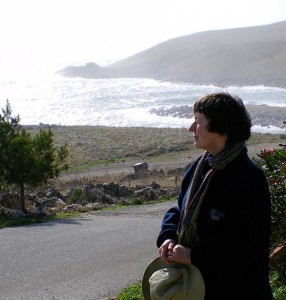
Leena Krohn on the way to Cape Tainaron, Southern Peloponnese, Greece; this is where Europe ends. Her novel entitled Tainaron appeared in 1985. – Photo: Mikael Böök (2008)
The world wide web, whose services most of us now use for work or entertainment, is a greater invention than we have, perhaps, realised up till now: according to the writer Leena Krohn, it is nothing less than an evolutionary leap
Technology combats the limitations of our senses, geography, and time. The human eye can’t compete with the visual acuity of an eagle, or even a cat, but with the best telescopes it can see into the early history of the universe, with new electron microscopes it can distinguish individual atoms.
The human senses nevertheless have an unbelievably broad bandwidth. About a million times more data flows to our brains by means of our senses than we could ever grasp consciously. More…
Trial and error?
Issue 4/2008 | Archives online, Essays, On writing and not writing

If you want to write, you need to do it every day, says the author Monika Fagerholm. Trial and error are necessary for her – and so is not being afraid of getting lost in the woods in the process, because only then can amazing things be found
Writers write and writers write every day. I remember seeing this in one of those inspirational guides on writing I enjoy reading – even if they don’t necessarily help you in pursuing your daily writing as much as you would hope. At the worst, they give you a kind of exhausting energy which just leaves you drained. And yes, turning to these kinds of manuals almost always involves an element of desperation; you don’t need advice when everything is going great. More…

